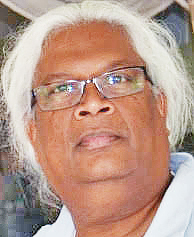Opinions
Water, water everywhere…

and effluents that contaminate land everywhere, East and West. When water infrastructure is damaged, people must depend on gifts of drinking water or else boil what they have, if that facility is preserved. Photos of Texans queuing for water emphasise the failure of US authorities, federal and state, to think ahead, and prevent disaster, instead of focussing on the struggle to rescue victims marooned by deep water. The US urgently needs fewer inept politicians, hungry developers, who exchange absorptive land for concrete, even in a low-lying city like Houston, among people who ignore science and mathematics. Meteorological services, with improved technology since Hurricane Sandy (2012, 233 deaths), predicted Harvey’s path and spread well in advance. The relentless publicity given by world media to the 2005 Gulf Coast hurricane trio of Katrina, (1836 deaths), Rita and Wilma, and Ike (2008, 74 deaths), plus Sandy at New Jersey, should have been enough to kick governments, state and federal, into tried-and-true ways of preventing at least the human tragedies. The responsibility is that of the Department of Homeland Security and its Federal Emergency Management Agency (FEMA). Trump seemed concerned with hurricane watch and preparation, but he fumbled the appointments to head those services. So there was haphazard planning and ineffective pre-emptive evacuation – especially of old, infirm or poor, who could hardly be expected to help themselves when the inevitable floods came – to minimise damage, casualties and catastrophes such as cholera and other illnesses. The Beaumont Hospital was evacuated after the floods. Indeed, a volunteer group from New Orleans, the Cajun Navy, seemed everywhere rescuing people. Where was FEMA on site?
After Ike, Obama administration proposed a Holland-style dyke to defend the Gulf Coast from destructive waters; it is nowhere in sight and rumoured to start in 2023, while Trump glibly talks of a wall to keep out constructive Hispanics. Damage is estimated at over $150 billion. So much for the great nation, which is getting a taste of its own destruction of other nations, and even now threatening North Korea and Venezuela, while its ally, Saudi Arabia, inhumanly bombs Yemen, killing thousands and starving the rest.
Over to South Asia; India and Pakistan have just celebrated their 70th independence anniversary, in time to face a disaster many times the scale of Texas, and much less publicised internationally, despite the heavy loss of life. The eagerly-awaited monsoon proved heavier than desired, and cities like Mumbai were quickly flooded, aggravated by uncertain knowledge of monsoon intensity – unlike hurricanes – over-crowding, unregulated growth, poor planning, poor drainage, and corruption. South Asian populations are denser than anywhere in the US, certainly along the Gulf Coast, therefore suffer greater losses; structures weak or poorly built, on risky locations, as most of Bangladesh, where flood damage occurs even after normal rains. The flooding is reported to have affected a wide stretch of the Himalayan foothills from UP to Bihar, Nepal and Assam, causing landslides, damaging roads, power lines, homes and inundating farmland.
But government action can mitigate disaster. Blocked drains and canals are common in South Asia, from abuse and poor maintenance, a task done by local authorities and therefore rife with corruption, a pandemic well-entrenched in East and West. Part of the region’s problem is that it relies mainly on relief for want of preparedness. Their shortage of resources e.g., boats as were plentiful in Texas, hampered voluntary relief. Over 1,200 have died in India, Nepal and Bangladesh, including collapse of a multi-storey building in Mumbai and landslides in Nepal; over 41 million are affected. Thousands are sheltered in relief camps.
Meanwhile in Texas, over 30,000 people are seeking shelter, even sleeping on floors, like so many South Asians and Chinese! Meanwhile, to the east of Florida, hurricane Irma is churning the Atlantic heading for the Caribbean and the US east coast; it will be there in ten days – to remind the USA, accustomed to look condescendingly at Asians in trouble, that arrogance is no protection against the wrath of nature.
Grasping what the adults said
 Romeo Kaseram
Romeo Kaseram
For adults to speak in code around me when I was growing up back home was to defeat the purpose of discretion. Given my tender age, diminutive frame, and small voice, there was a compensating intuition which left me with more than an idea, even as the pictures formed in my head of a bigger world beyond me, as the adults, after staring at my big head and large eyes, thought it safe to go ahead with secret dialogue among themselves in my presence. It was from this neutral ground of childhood, it being taken for granted by those around me I would not understand what was described as “adult
talk”, where I began to form pictures in my mind about a darker and deceptive world. Some of what they discussed among themselves were quite serious, and having grasped the enormity of what was happening to friends, neighbours and close family members, left me with the inner turmoil of being unable to handle the complexity of the adult world, given there was no one I could turn to who would understand how a young boy had come to be a container for such precocious knowledge. So it came to be I began to understand what was occurring when the adults spoke of a young man who suddenly rode into the village one morning, leaned his bicycle on a post by the rumshop, and took up position just outside the bar where he had a clear view of the roadway. Right away I knew how the adults around me felt about this young man who stood with legs apart with his blackened boots sticking out from under the hem of his trousers so it shone brilliantly in the sun.
Right away there was suspicion among the adults from the way he casually took a cigarette out of the pack, knocked its filter on the back of the box of matches, and lit it with his hands cupping the flame. Something about the action was too smooth, the display of the cigarette pretentious, the blowing of the first puff of smoke high into the air, both of his eyes closed, too sensuous.
Discussion about this stranger in our living room was filled with suspicion: he was a “Saga-boy”. Without knowing what the word meant, I knew from the acid coming out of the mouth of my mother that accompanied its enunciation this young man was not to be trusted. His actions were rehearsed and effortless, as if he was a movie-star.
It was not long after this young man caught the eye of one of the girls in the village, who visiting the other side of the rumshop which was part hardware, but mostly a grocery stuffed with bags of rice, damp brown sugar, and potatoes with many eyes leafy with new growth, found a few moments to chat. Her visits to the grocery became frequent, the young lady spending more time chatting with the stranger so the red salted butter melted and ran out of its brown paper wrapping.
My mother was livid in the living room, saying to my old man whose head was buried in the broad-sheet newspaper of the day, “He is friending her!” The tone of the word, “friending”, as it fell out of my mother’s mouth, had such a sharp point had it being a knife it would have stuck to the floor and hummed like a well-wrought blade. I understood this to be a dire development, comparable to one of the lessons about souls perishing in the flames of hell which were plastered as pictures on our Sunday school walls.
“Nothing good will come of this, you just wait!” my mother prognosticated.
My old man’s response: “Yes. He is a smart-man.”
Right away my young mind grasped what my old man was saying. This young man by the rumshop being a “smart-man” did not mean he was as bright as the scientist we had heard about on the radio one morning. Here was a man with so much intelligence he had figured out how fast a spaceship had to travel to hit the speed of light, and when he was done doing those sums, there was still lots of smart left for him to solve another problem about the universe.
If it was anything, I understood this young man by the rumshop to be an entirely different kind of “smart”. I understood it to mean he was wrongly using his intelligence to outsmart someone else. While I was not old enough to grasp the vocabulary and its meaning, there was a place within me beyond articulation, where I understood the man by the rumshop was a confidence man, a “con-man”. My parents knew it; the entire village knew it; and I knew it, despite I was yet to be introduced to this bigger, darker side of the world.
Apparently, the young lady did not know it, and one evening my mother told my old man, “He fool she, and he gone.”
I knew right away what this meant, my young heart heavy for the victim.
